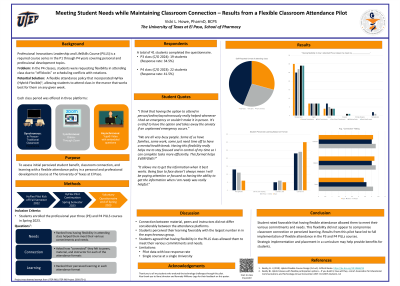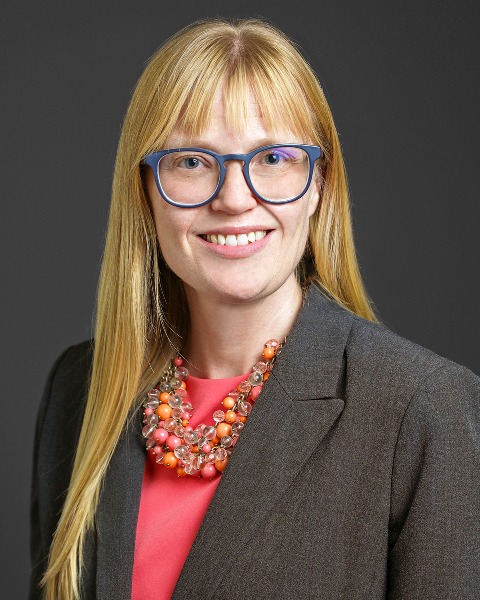Pharmacy Practice
(98) Meeting Student Needs while Maintaining Classroom Connection – Results from a Flexible Classroom Attendance Pilot


Vicki Howe, PharmD, BCPS (she/her/hers)
Clinical Assistant Professor
The University of Texas at El Paso
El Paso, Texas, United States
Primary Author(s)
Objective : Students in the professional year four (P4) Professional Innovations Leadership and Lifeskills (PILLS) course were requesting flexibility in attendance for rotation conflicts. A pilot of flexible attendance was implemented during the 2022-2023 school year. Students could attend class in any platform (in-person, online synchronously, or asynchronously) for any week without prior approval. The purpose of this study was to assess initial perceived student benefit, engagement, and learning.
Methods: A voluntary questionnaire was administered to students enrolled in the professional year three (P3) and P4 PILLS courses in Spring 2023. Students ranked on a Likert scale how having flexibility in attending class helped them meet their personal, work, and other school commitments and their wellbeing and mental health needs. Students were asked how connected they felt to their peers, material/content of the class and instructor for each of the attendance platforms and to rank their learning by platform.
Results: A total of 41 students completed the full questionnaire with response rates of 34.5% (P3) and 41.5% (P4). Students mostly strongly agreed that flexibility in attending PILLS helped with their personal, work, and other school commitments and their wellbeing and mental health needs. Connection to classmates, class material and instructor was similar across the attendance platforms. Students ranked “learned a lot” slightly more for asynchronous participation, but overall was similar across the platforms. Students requested continuation of the flexible attendance policy.
Conclusions: Student rated favorable having flexible attendance allowing them to meet their various commitments and needs. This flexibility did not appear to compromise classroom connection or perceived learning. Results from this pilot have led to full time implementation of flexible attendance in the P3 and P4 PILLs courses.
Methods: A voluntary questionnaire was administered to students enrolled in the professional year three (P3) and P4 PILLS courses in Spring 2023. Students ranked on a Likert scale how having flexibility in attending class helped them meet their personal, work, and other school commitments and their wellbeing and mental health needs. Students were asked how connected they felt to their peers, material/content of the class and instructor for each of the attendance platforms and to rank their learning by platform.
Results: A total of 41 students completed the full questionnaire with response rates of 34.5% (P3) and 41.5% (P4). Students mostly strongly agreed that flexibility in attending PILLS helped with their personal, work, and other school commitments and their wellbeing and mental health needs. Connection to classmates, class material and instructor was similar across the attendance platforms. Students ranked “learned a lot” slightly more for asynchronous participation, but overall was similar across the platforms. Students requested continuation of the flexible attendance policy.
Conclusions: Student rated favorable having flexible attendance allowing them to meet their various commitments and needs. This flexibility did not appear to compromise classroom connection or perceived learning. Results from this pilot have led to full time implementation of flexible attendance in the P3 and P4 PILLs courses.

.png)